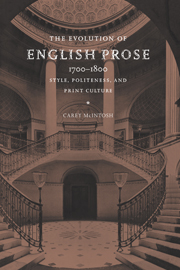Book contents
- Frontmatter
- Contents
- Preface
- 1 The ordering of English
- 2 Literacy and politeness: the gentrification of English prose
- 3 Testing the model
- 4 Loose and periodic sentences
- 5 Lofty language and low
- 6 Nominal and oral styles: Johnson and Richardson
- 7 The New Rhetoric of 1748 to 1793
- 8 The instruments of literacy
- 9 Politeness; feminization
- 10 Style and rhetoric
- Epilogue: language change
- References
- Index
5 - Lofty language and low
Published online by Cambridge University Press: 18 December 2009
- Frontmatter
- Contents
- Preface
- 1 The ordering of English
- 2 Literacy and politeness: the gentrification of English prose
- 3 Testing the model
- 4 Loose and periodic sentences
- 5 Lofty language and low
- 6 Nominal and oral styles: Johnson and Richardson
- 7 The New Rhetoric of 1748 to 1793
- 8 The instruments of literacy
- 9 Politeness; feminization
- 10 Style and rhetoric
- Epilogue: language change
- References
- Index
Summary
“High diddle diddle”
Will rank as an idyll
(W. S. Gilbert, Patience: 1881)In chapters 2 and 3 the word “low” was applied to early eighteenth-century prose; and lowness was associated with a certain vocabulary, certain kinds of metaphors, “homely,” rural, everyday, and common: Lane's “blunt end of the Wedg,” Swift's house on fire that neighbors “run with Buckets to quench.” Chapter 4 investigated some of the uses that periodic sentences can be put to, including the high eloquence of Burke and Gibbon. “High” and “low” describe the end points of a hierarchy of styles constructed according to the rules of decorum; these are concepts that sometimes dominated and always influenced the prose compositions of educated persons from classical times at least until 1800. As chapter 4 explored the expressive potential of loose and periodic styles, so chapter 5 will inventory some of the variations played on high and low language in the eighteenth century. My thesis is that as English prose became more written and more obviously “rhetorical,” it was able to exploit the two extremes of high and low more effectively. We find this capacity most completely realized not in Johnson, who wrote grand prose and understood tragedy, but in Johnson's biographer, whose literary instincts were comic and anecdotal.
Boswell's Life of Johnson splendidly embodies the verbal energies implicit in the separation of styles. Language and style in this long, lopsided work illuminate contradictions that turn out to be essential to Boswell's biography. It seems to me that the mix of “high” and “low” language in Boswell's Life would not have been possible for writers of the first half of the century.
Information
- Type
- Chapter
- Information
- The Evolution of English Prose, 1700–1800Style, Politeness, and Print Culture, pp. 98 - 116Publisher: Cambridge University PressPrint publication year: 1998
